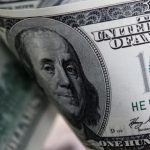
LONDON/TOKYO (Reuters) -The dollar hit a one-month high against a basket of its peers on Wednesday as the safe haven gained on the hit to sentiment from soft Chinese data and global rate setters arguing against imminent cuts, while sterling rose on higher British inflation.
The dollar index reached 103.58 its highest since 13 December, extending gains after a 0.67% jump on Tuesday.
That jump was driven in part by the Federal Reserve’s Christopher Waller saying that while the U.S. is “within striking distance” of the Fed’s 2% inflation goal, the Fed should not rush towards cuts in its benchmark interest rate until it is clear lower inflation will be sustained.
Market expectations of a rate cut in March have eased to around a 60% chance versus roughly a 75% view in the prior session, according to CME’s FedWatch Tool, and U.S. yields rose. [US/]
Also in the mix was data showing China’s economy grew 5.2% in 2023, slightly more than the official target, but it was a far shakier recovery than many analysts and investors expected. Some December indicators released along with the GDP data were more grim, suggesting the country’s protracted property crisis is deepening.
That weighed on Asian and European shares, and the broader market mood. [MKTS/GLOB]
“A combination of weakish China data and a pushback by both ECB and Fed officials against early easing is weighing on risk sentiment and supporting the dollar,” said Chris Turner global head of markets at ING.
“It is hard to see that sentiment changing today should US December retail sales come in on the strong side.”
That data is due at 1330 GMT, and will give the latest indication of the health of the U.S. economy.
The dollar gained 0.45% against the rate-sensitive Japanese yen, to 147.84 trading at its highest since early December, while the China-exposed Australian dollar shed 0.62% to $0.6541 its lowest since Dec 12.
The dollar also climbed 0.1% on China’s offshore yuan to 7.2265, hitting a new two-month high.
The euro was flat at $1.10870 steadying after a 0.7% drop on Tuesday after Waller’s remarks, as comments from European Central Bank Policy makers also pushing back on imminent rate cuts in Europe helped put a floor under the euro.
Investor bets for ECB rate cuts are excessive and possibly self defeating because they could actually hold back monetary easing, Dutch central bank chief Klaas Knot told CNBC on Wednesday.
The pound was unusual in climbing on the dollar, up 0.1% to $1.2646, as a rise in British inflation data reinforced market expectations that the Bank of England will be slower to cut rates than other central banks.
The data “supports our view that whilst price growth is set to cool faster than the BoE had anticipated, continued economic resilience will prevent inflation from cooling at a pace that would justify rate cuts in the first half of this year,” said Nick Rees, FX Market Analyst at Monex Europe.
He said this would be supportive of the pound and “is likely to play out most clearly on crosses, particularly against the euro as is visible in the market response to today’s data.”
The euro touched a one-month low on the pound and was last down 0.15% at 85.93 pence. The pound was also up 0.8% against the Australian dollar at a four-month high.
To read the full article, Click Here

